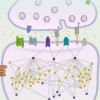Posts tagged serotonin

A New Neurotransmitter (D-Aspartic Acid)
May 13th
In 2011, you would think that neuroscience is focused on discovering answers to high-level questions about the brain; how consciousness arises, how emotions work, what is autism, etc. Although progress is being made in all of those areas, it seems that we still have a great deal to learn about even the most basic components of the brain.
Recently, a group from Naples reports that D-Aspartic acid functions as a neurotransmitter in both a mammal the rats (Rattus norvegicus), and a mollusk (Loligo vulgaris). D-Aspartic acid (D-Asp) has been known to scientists for well over a century. However, its role as a More >

New Technique may Unravel Secrets of Biochemistry
Jan 11th
A new paper from David Kleinfeld’s Laboratory at UC San Diego details an exciting new technique for studying biochemistry in the brain. The paper, published in the journal Nature Neuroscience, outlines a novel method for studying cell-to-cell signals that are the basis of neurotransmission. It has significant potential for uncovering the mechanisms by which many psychiatric drugs work.
What did the group find? Kleinfeld’s group devised a technique that uses elaborately-named “cell-based neurotransmitter fluorescent engineered reporters” (CNiFERs for short) to examine how neurotransmitter receptors are activated. CNiFERs are cells that have been engineered to change color when acted upon by a specific neurotransmitter. More >

Depression Genetics Suffer Major Setback
Jul 6th
A 2003, a paper by Caspi and colleagues offered tantalizing clues about the genetics of depression, in what was widely-acclaimed as a breakthrough paper for psychiatric genetics as a whole. Now, new research by Katleeen Merikangas at the National Institute of Mental Health queries the results taking us, according to Science magazine, back to the drawing board.
What was so important about Caspi et al.? The original Caspi paper of 2003 looked at a sample of 847 New Zealanders, and examined whether gene-environment interactions might lead to depression. The research team were particularly interested in genes involved in serotonin transportation and reception - serotonin has More >
